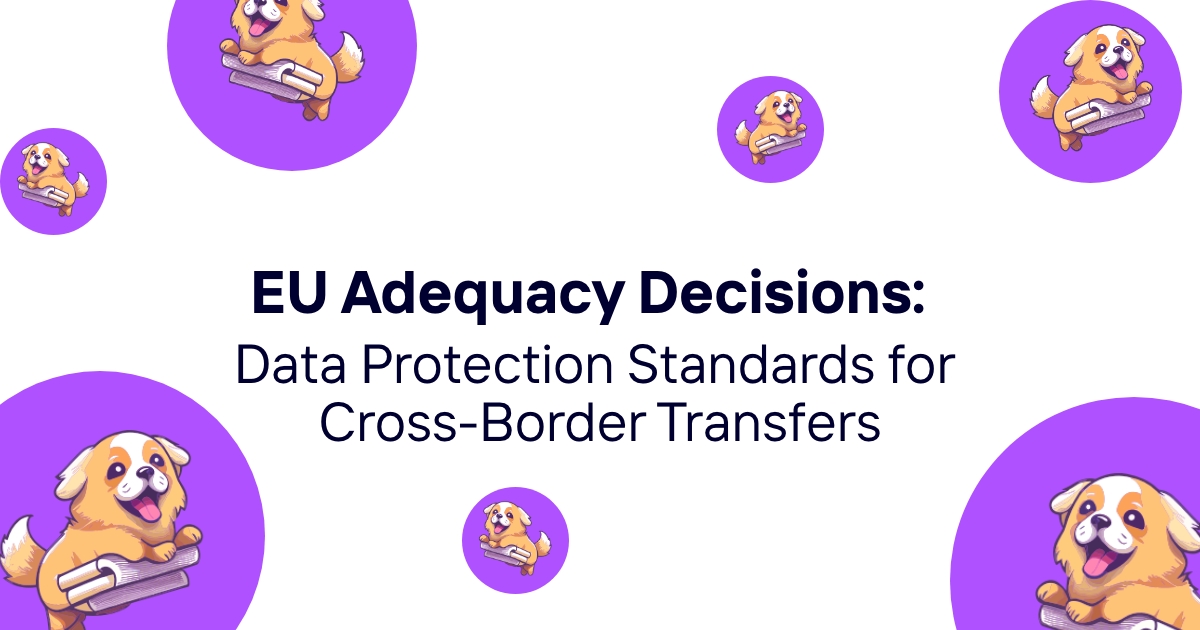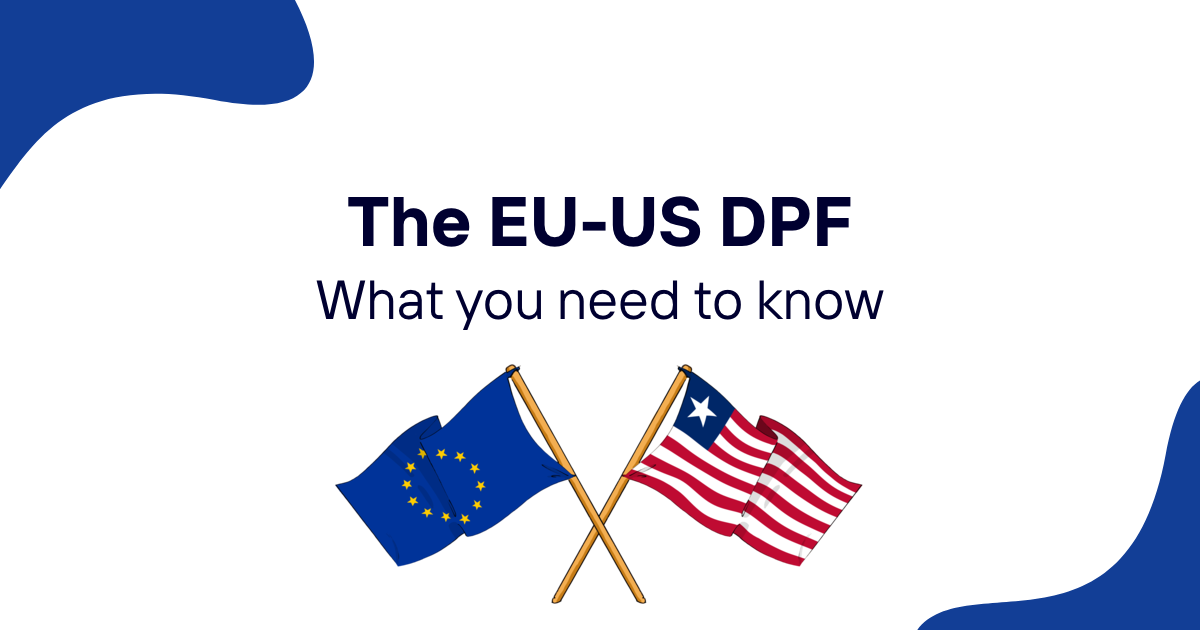EU adequacy decisions represent one of the most sophisticated mechanisms in global data protection law, enabling seamless data transfers between the European Union and third countries that demonstrate comparable privacy safeguards. These legal determinations have become the gold standard for international data flows, affecting billions of personal data transfers daily.
But what exactly makes a country "adequate" in the eyes of European regulators? The answer involves a complex evaluation process that goes far beyond simple checkbox compliance.
Table of contents
- What are EU adequacy decisions?
- The legal framework behind adequacy decisions
- The adequacy decision process
- Current countries with adequacy decisions
- Key requirements for adequacy status
- Benefits of adequacy decisions
- Challenges and limitations
- Recent developments and reviews
- Impact on businesses and data flows
- Future outlook for adequacy decisions
- ComplyDog: Streamlining GDPR compliance
What are EU adequacy decisions?
An adequacy decision constitutes a formal determination by the European Commission that a non-EU country, territory, or specific sector within that jurisdiction provides an adequate level of protection for personal data. Think of it as the EU's stamp of approval for data protection standards outside its borders.
The concept emerged from Article 45 of the General Data Protection Regulation (GDPR), which empowers the European Commission to assess whether third countries offer sufficient safeguards for personal data transfers. When a country receives adequacy status, personal data can flow freely from the EU to that destination without requiring additional protective measures.
This mechanism serves multiple purposes. It facilitates international commerce while maintaining high privacy standards. It also creates incentives for countries worldwide to strengthen their data protection frameworks to access the lucrative EU market.
The adequacy framework operates on the principle of "essential equivalence" rather than identical legislation. Countries don't need to copy-paste GDPR provisions verbatim. Instead, they must demonstrate that their overall data protection system achieves substantially the same level of protection through various means – whether through comprehensive privacy laws, sectoral regulations, or self-regulatory mechanisms.
The legal framework behind adequacy decisions
The GDPR provides the foundational legal structure for adequacy decisions through Article 45, which outlines specific criteria the European Commission must evaluate. The regulation requires assessment of several key areas: the rule of law, respect for human rights, relevant legislation, independent supervision, and international commitments.
Article 45 specifically mandates that the Commission consider:
- The rule of law and respect for human rights and fundamental freedoms
- Relevant legislation, both general and sectoral
- Professional rules and security measures
- Effective and enforceable data subject rights
- Effective administrative and judicial redress
- Independent supervisory authorities
The Commission must also evaluate international commitments the third country has undertaken, particularly regarding data protection and human rights. This includes participation in multilateral treaties and cooperation with international organizations.
The legal framework establishes a dynamic system where adequacy decisions remain under constant review. The Commission must monitor developments in third countries and can suspend or withdraw adequacy status if protection levels deteriorate. This creates ongoing pressure for countries to maintain and improve their data protection standards.
Interestingly, the adequacy framework allows for partial decisions covering specific sectors or types of transfers. The US-EU Data Privacy Framework exemplifies this approach, covering only commercial organizations participating in the framework rather than all US data processing activities.
The adequacy decision process
The adequacy decision process involves multiple stakeholders and several distinct phases, creating a comprehensive evaluation system designed to ensure thorough assessment of third country data protection standards.
Initial assessment phase
The European Commission initiates the process by conducting a detailed analysis of the third country's data protection framework. This assessment typically takes 12-18 months and involves extensive consultation with the country's data protection authorities, government officials, and relevant stakeholders.
The Commission evaluates legislation, enforcement mechanisms, judicial remedies, and practical implementation of data protection rules. Officials examine case law, regulatory decisions, and enforcement actions to understand how data protection operates in practice rather than just on paper.
European Data Protection Board opinion
Following the initial assessment, the Commission presents its findings to the European Data Protection Board (EDPB), which comprises data protection authorities from all EU member states. The EDPB provides a formal opinion on whether the third country meets adequacy standards.
This opinion carries significant weight in the final decision. The EDPB brings practical enforcement experience and can identify potential gaps or concerns that might not be apparent from purely legal analysis. The board's opinion becomes part of the public record and influences subsequent monitoring activities.
Member state approval
The Commission's adequacy decision requires approval from representatives of EU member states through the comitology procedure. This involves a committee of member state representatives who vote on whether to approve the proposed decision.
Member states can raise concerns about specific aspects of the third country's data protection framework or request additional safeguards. The approval process ensures that adequacy decisions reflect consensus among EU member states rather than just the Commission's assessment.
Adoption and implementation
Once approved, the Commission formally adopts the adequacy decision, which becomes immediately effective across all EU member states. The decision typically includes specific conditions, limitations, or requirements that must be maintained for adequacy status to continue.
The adoption process includes publication in the Official Journal of the European Union and notification to relevant international bodies. Third countries must typically implement specific monitoring and reporting mechanisms to demonstrate ongoing compliance with adequacy requirements.
Current countries with adequacy decisions
The European Commission has granted adequacy status to a diverse group of countries and territories, reflecting different approaches to data protection while maintaining essential equivalence with EU standards.
Traditional data protection jurisdictions
Several countries received adequacy decisions based on comprehensive data protection legislation that closely aligns with European principles:
New Zealand achieved adequacy status through its Privacy Act, which provides strong individual rights and independent supervision. The country's common law legal system and strong rule of law tradition supported its adequacy case.
Switzerland received adequacy recognition based on its Federal Act on Data Protection, which underwent significant amendments to maintain alignment with GDPR requirements. The country's federal structure required coordination between national and cantonal authorities.
Argentina became the first Latin American country to receive adequacy status, demonstrating that adequacy decisions aren't limited to Western developed nations. The country's Personal Data Protection Act established comprehensive protection standards.
Specialized adequacy decisions
Some jurisdictions received adequacy status for specific sectors or types of processing:
Canada received adequacy recognition only for commercial organizations subject to the Personal Information Protection and Electronic Documents Act (PIPEDA). Public sector processing remains outside the adequacy framework.
United States achieved adequacy status through the EU-US Data Privacy Framework, which replaced the invalidated Privacy Shield arrangement. This framework covers only commercial organizations that self-certify compliance with specific privacy principles.
Island and territory adequacy decisions
Several smaller jurisdictions received adequacy status based on their adoption of EU-aligned data protection legislation:
The Faroe Islands, Guernsey, Jersey, and Isle of Man all received adequacy decisions after implementing comprehensive data protection laws that closely mirror GDPR requirements. These territories benefit from their small size and ability to quickly adapt legislation.
Asian adequacy decisions
Japan achieved adequacy status through a combination of its Personal Information Protection Act and supplementary rules that address specific GDPR requirements. The decision required Japan to implement additional safeguards for sensitive personal data.
South Korea received adequacy recognition based on its Personal Information Protection Act and strong enforcement mechanisms. The country's advanced digital economy and robust privacy framework supported its adequacy case.
Key requirements for adequacy status
Achieving adequacy status requires demonstrating compliance with several fundamental requirements that ensure essential equivalence with EU data protection standards.
Legal framework requirements
Countries must establish comprehensive legal frameworks that provide protection for personal data processing. This doesn't necessarily require a single omnibus privacy law – sectoral legislation can suffice if it provides comprehensive coverage.
The legal framework must include:
- Clear definitions of personal data and data processing
- Lawful bases for processing personal data
- Special protection for sensitive personal data
- Rights for data subjects
- Obligations for data controllers and processors
- Enforcement mechanisms and penalties
Independent supervision
Adequacy decisions require the existence of independent supervisory authorities with sufficient powers and resources to enforce data protection rules effectively. These authorities must be free from external influence and have the technical and financial means to carry out their duties.
Supervisory authorities must possess:
- Investigative powers to examine data processing activities
- Corrective powers to impose restrictions or sanctions
- Authorization powers for high-risk processing
- Advisory powers to provide guidance to stakeholders
- Complaint handling mechanisms for individuals
Data subject rights
Third countries must provide individuals with enforceable rights regarding their personal data. These rights must be substantially equivalent to those provided under GDPR, though the specific mechanisms for exercising rights may differ.
Essential data subject rights include:
- Right to information about data processing
- Right of access to personal data
- Right to rectification of inaccurate data
- Right to erasure in appropriate circumstances
- Right to restrict processing
- Right to data portability
- Right to object to processing
International transfers
Countries seeking adequacy status must have appropriate mechanisms for regulating onward transfers of personal data to third countries. This prevents adequacy decisions from becoming backdoor routes for circumventing EU data protection requirements.
Transfer mechanisms must include:
- Restrictions on transfers to countries without adequate protection
- Safeguards for transfers to non-adequate countries
- Derogations for specific situations
- Oversight of international transfer activities
Benefits of adequacy decisions
Adequacy decisions provide substantial benefits for both the EU and third countries, creating a framework that facilitates international data flows while maintaining high protection standards.
Simplified compliance for businesses
Organizations can transfer personal data to adequate countries without implementing additional safeguards such as Standard Contractual Clauses or Binding Corporate Rules. This significantly reduces compliance costs and administrative burden.
The simplification benefits include:
- Reduced legal documentation requirements
- Faster implementation of international data transfers
- Lower compliance costs for multinational organizations
- Simplified privacy impact assessments
- Reduced regulatory oversight requirements
Enhanced international cooperation
Adequacy decisions foster closer cooperation between EU and third country data protection authorities. This cooperation improves enforcement effectiveness and creates opportunities for sharing best practices.
Cooperation benefits include:
- Joint enforcement actions against cross-border violations
- Shared expertise and training programs
- Coordinated responses to emerging privacy challenges
- Harmonized interpretation of data protection principles
- Improved assistance for cross-border complaint handling
Economic advantages
Countries with adequacy status gain preferential access to EU markets and can position themselves as attractive destinations for international businesses seeking to process EU personal data.
Economic benefits include:
- Increased foreign direct investment
- Growth in data-intensive industries
- Enhanced competitiveness in global markets
- Attraction of multinational corporate headquarters
- Development of data processing and technology sectors
Regulatory efficiency
Adequacy decisions create economies of scale in data protection regulation by establishing common standards that reduce fragmentation and regulatory arbitrage.
Efficiency gains include:
- Reduced regulatory duplication
- Consistent interpretation of data protection principles
- Simplified compliance for multinational organizations
- Improved predictability for cross-border data flows
- Enhanced regulatory coordination
Challenges and limitations
Despite their benefits, adequacy decisions face several challenges that can complicate their implementation and effectiveness.
Political and diplomatic considerations
Adequacy decisions inevitably involve political considerations that can influence their adoption and maintenance. Changes in government policies or diplomatic relations can affect adequacy status.
Political challenges include:
- Diplomatic tensions affecting adequacy negotiations
- Changes in government priorities regarding data protection
- Pressure from industry groups or civil society organizations
- International trade disputes affecting data flows
- Geopolitical considerations in adequacy assessments
Dynamic legal landscapes
Data protection law continues to evolve rapidly, creating challenges for maintaining adequacy status over time. Countries must continuously adapt their frameworks to address new technologies and processing methods.
Evolution challenges include:
- Emerging technologies requiring new regulatory approaches
- Changes in data processing business models
- New privacy threats and vulnerabilities
- Evolving international standards and best practices
- Pressure for regulatory harmonization
Enforcement and monitoring
Maintaining adequacy status requires ongoing monitoring and enforcement, which can strain regulatory resources and create compliance burdens for businesses.
Monitoring challenges include:
- Resource constraints for supervisory authorities
- Difficulty monitoring compliance across different sectors
- Challenges in assessing practical implementation
- Coordinating enforcement across multiple jurisdictions
- Balancing monitoring with regulatory efficiency
Sector-specific considerations
Different sectors may require tailored approaches to data protection, creating complexity in adequacy assessments and potential gaps in coverage.
Sectoral challenges include:
- Varying data protection needs across industries
- Specialized regulatory requirements for specific sectors
- Difficulty achieving comprehensive coverage
- Potential for regulatory fragmentation
- Challenges in addressing sector-specific risks
Recent developments and reviews
The adequacy decision framework continues to evolve through regular reviews and updates that reflect changing circumstances and emerging challenges.
Periodic review requirements
The GDPR requires the Commission to periodically review adequacy decisions and report findings to the European Parliament and Council. These reviews assess whether third countries continue to meet adequacy standards and identify areas for improvement.
Recent reviews have covered:
- Japan's adequacy decision (reviewed in 2023)
- Eleven adequacy decisions adopted under the previous Data Protection Directive
- The EU-US Data Privacy Framework (reviewed in 2024)
- United Kingdom adequacy decisions (extended in 2025)
Emerging challenges
Recent developments have highlighted new challenges for adequacy decisions, including government surveillance programs, artificial intelligence regulation, and changing international political dynamics.
Key emerging issues include:
- Government access to personal data for national security purposes
- Artificial intelligence and automated decision-making
- Cross-border law enforcement cooperation
- Digital sovereignty and data localization requirements
- Changing international trade and diplomatic relationships
Future developments
The Commission continues to engage with additional countries regarding potential adequacy decisions, while also working to address emerging challenges in existing adequacy relationships.
Potential future developments include:
- New adequacy decisions for additional countries
- Updates to existing adequacy decisions to address new challenges
- Enhanced monitoring and enforcement mechanisms
- Improved cooperation between supervisory authorities
- Development of new transfer mechanisms for non-adequate countries
Impact on businesses and data flows
Adequacy decisions have profound implications for how businesses structure their international operations and manage cross-border data flows.
Operational considerations
Organizations must carefully consider adequacy status when designing their data architecture and choosing service providers. The presence or absence of adequacy decisions can significantly influence business decisions about where to locate data processing activities.
Key operational impacts include:
- Data center location decisions
- Choice of cloud service providers
- Structuring of international business relationships
- Design of data processing systems
- Development of privacy compliance programs
Compliance strategies
Businesses must develop comprehensive compliance strategies that account for adequacy decisions while preparing for potential changes in adequacy status.
Effective strategies include:
- Regular monitoring of adequacy decision developments
- Diversification of data processing locations
- Implementation of multiple transfer mechanisms
- Development of contingency plans for adequacy withdrawals
- Investment in privacy-enhancing technologies
Risk management
Organizations must assess and manage risks associated with adequacy decisions, including potential withdrawals or suspensions that could disrupt business operations.
Risk management considerations include:
- Assessment of adequacy decision stability
- Development of alternative transfer mechanisms
- Implementation of data localization capabilities
- Establishment of incident response procedures
- Regular review and updating of privacy policies
Future outlook for adequacy decisions
The future of adequacy decisions will likely be shaped by several trends and developments that are already beginning to emerge.
Technological developments
Advances in technology, particularly artificial intelligence and privacy-enhancing technologies, will influence how adequacy decisions are structured and implemented.
Technological considerations include:
- AI and automated decision-making regulation
- Privacy-enhancing technologies for data protection
- Blockchain and distributed ledger technologies
- Internet of Things and edge computing
- Quantum computing and cryptographic protection
Regulatory evolution
Data protection law will continue to evolve globally, creating new challenges and opportunities for adequacy decisions.
Regulatory trends include:
- Increasing adoption of comprehensive privacy legislation
- Development of specialized AI and emerging technology regulations
- Enhanced focus on children's privacy protection
- Strengthening of cross-border enforcement mechanisms
- Growing emphasis on data sovereignty and localization
International cooperation
The future success of adequacy decisions will depend on continued international cooperation and coordination among data protection authorities.
Cooperation opportunities include:
- Development of multilateral adequacy frameworks
- Enhanced information sharing between supervisory authorities
- Coordinated enforcement actions against cross-border violations
- Joint development of regulatory guidance and best practices
- Harmonization of data protection standards and interpretations
ComplyDog: Streamlining GDPR compliance
Managing GDPR compliance across multiple jurisdictions, including those with adequacy decisions, presents complex challenges for businesses of all sizes. ComplyDog provides comprehensive compliance management solutions that help organizations navigate these complexities with confidence.
ComplyDog's platform offers automated compliance monitoring, policy management, and reporting capabilities that simplify the process of maintaining GDPR compliance across different jurisdictions. The platform's intelligent automation helps businesses track adequacy decision developments, manage cross-border data transfer requirements, and maintain up-to-date compliance documentation.
With features designed specifically for software businesses, ComplyDog enables organizations to focus on their core operations while ensuring robust data protection compliance. The platform's user-friendly interface and comprehensive reporting capabilities make it easy for businesses to demonstrate compliance with GDPR requirements and adequacy decision obligations.
For businesses operating in the complex landscape of international data transfers, ComplyDog provides the tools and expertise needed to maintain compliance efficiently and effectively. The platform's comprehensive approach to compliance management ensures that organizations can confidently navigate the evolving world of data protection regulation while maximizing the benefits of adequacy decisions for their international operations.


















